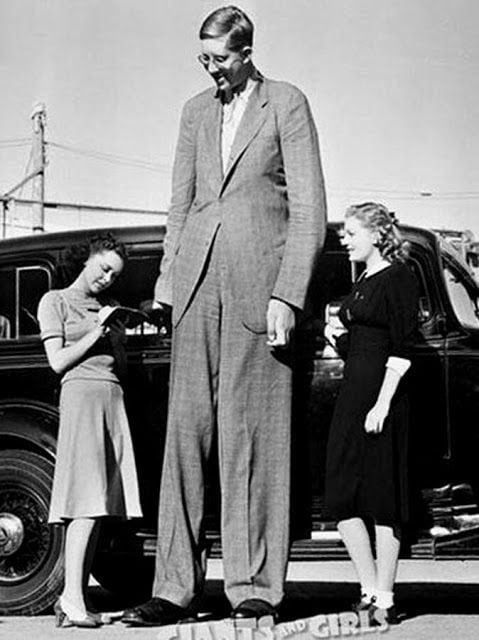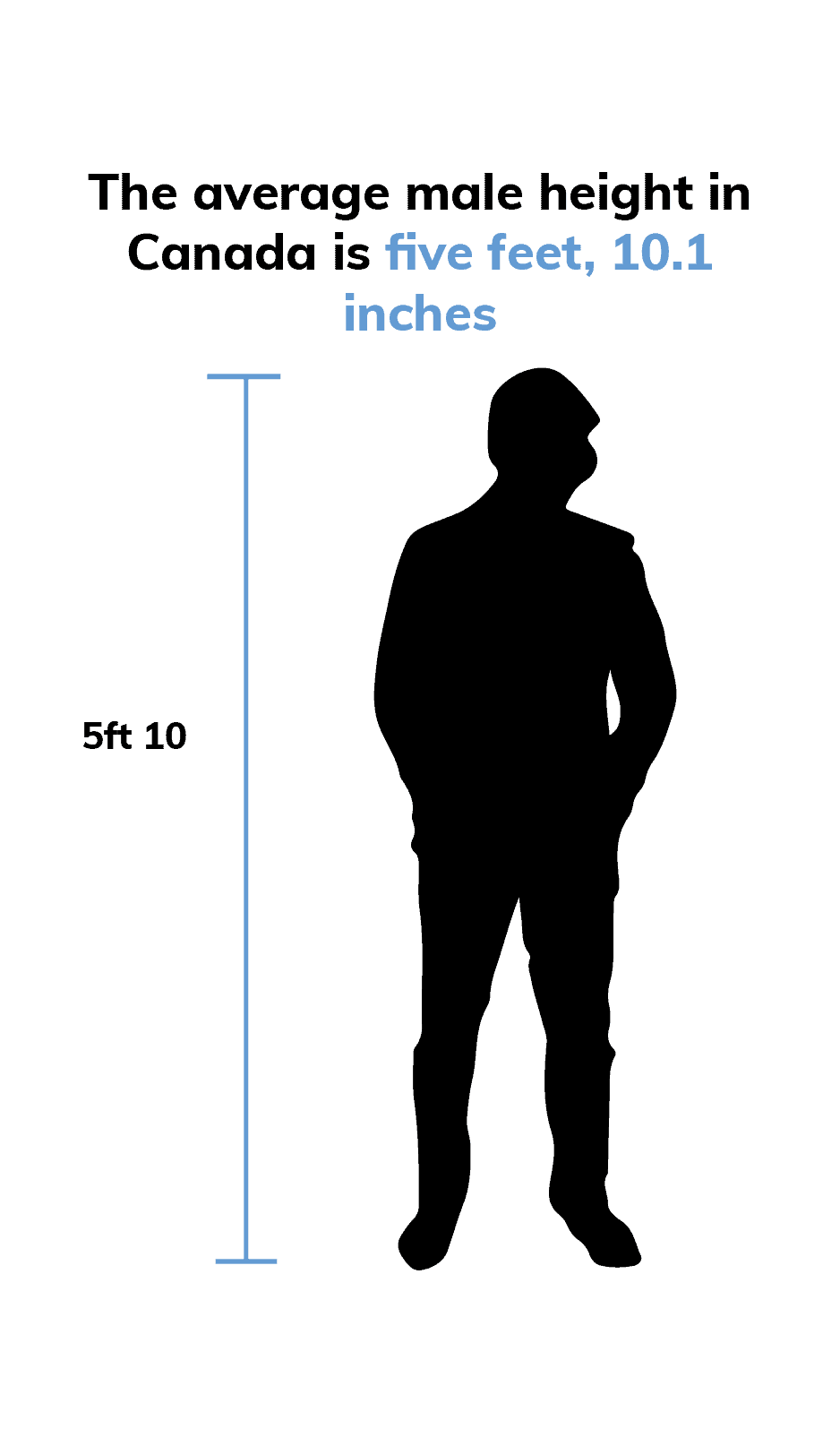Can you picture a human male as tall as eight feet, 11.1 inches? It seems like a stretch. No pun intended. But that was Robert Pershing Wadlow's height before his death in 1940. He was and still is the tallest man that ever existed.
In 2012, the height of the shortest man was 21.5 inches. He was Chandra Bahadur Dangi from Rhimkholi, Nepal. He died in 2015. These heights are obviously not average and of course, all over the world, men vary in height.
Your height is an important factor from the time of your birth. Doctors measured your height and weight throughout your formative years to ensure your physical development was on track. And, even through adulthood, doctors still take your measurements to ascertain the status of your physical health.
Now that you're no longer growing, how do you measure up when considering the average height for men in Canada? And why does is it even matter? Read on to find out the important role that height can play when it comes to your health.
Average Male Height in Canada
Internationally, it's hard to define a standard or average height for males as there's a vast difference in many countries. The height of the average male in other countries ranges from five feet, four inches in the Philippines to five feet, 11 inches in the Netherlands.
It's also hard to define a worldwide average height as methods in measurement vary in different countries. There are also discrepancies when it comes to factors such as the percentage of the population measured when their measurements were taken, and the amount of data collected to determine the average height of the population.
The average male height in Canada is five feet, 10.1 inches, or exactly 178.1 cm. Incidentally, five feet, 10 inches is the average male height in quite a few countries, including Germany and Australia, give or take a few inches.
This is tall for a Canadian male especially when you consider that the percentage of Canadian men shorter than six feet, three inches is 98.82%.
What Can’t Tall Guys Do?
So, what's in a height? Is it important to be tall or taller than average? Many tall people may disagree as they would have encountered some of the following issues in their adult lives due to their height:
Disclaimer:
All, or some of the products featured on this page are from our affiliated partners who may compensate us for actions and or sales completed as a result of the user navigating the links or images within the content. How we present the information may be influenced by that, but it in no way impacts the quality and accuracy of the research we have conducted at the time we published the article. Users may choose to visit the actual company website for more information.
Height Requirements
There is usually a height requirement at amusement park rides. You may assume it only affects shorter people as it's usually set as a guide to help determine the rides that are appropriate for younger children. However, if you're too tall, these supposedly fun rides can be uncomfortable due to a lack of legroom or headspace needed to accommodate taller persons.
Head Danger
What others consider the normal height of many everyday items can be a hazard to taller men. Things made with the height of the average person in mind, such as street signs, bus side mirrors, and even door frames often pose a hazard to taller men.
Limited Sports Car Options
Buying a sports car might be an agonizing decision for taller men. This isn't only because of the higher price tag, but also because of the size of the car. Most sports cars are two-seaters with minimal legroom. A taller person who does opt for a sports car might have difficulty maneuvering in and out of it, and may even have to slouch once inside. Not an ideal situation, given the investment.
Back Pain
Taller people tend to suffer more often from back pain. Longer limbs need to generate more rotational force which puts more stress on bones and joints. Back pain is also often a major factor for taller men who unconsciously slouch to be at the level of their shorter peers. This puts undue strain on back muscles.
What Can Tall Guys Do?
Height, however, does have its advantages, especially for taller men. An analysis by the Journal of Human Capital concluded that height could result in a 9 to 15 percent salary increase, specifically for people in the 75th height percentile. Those extra inches could add up to almost $800 more in earnings per year.
Many people also believe that women prefer dating taller men. There have been many studies around this theory. In 2014, a study by Science Daily found that this concept actually developed because women equated height with protection. However, the jury is still out on whether this theory still holds today.
Maybe the attraction has more to do with confidence. Taller people have the height to "strut their stuff" and this can increase their confidence. It certainly would explain the reference to "the air up there" being "rare".
Or maybe this confidence is inspired by the fact that the occurrence of certain health issues also diminishes the taller you are, including the risk of diabetes, dementia, and heart disease.
Related Article
Not to worry, We've published the average height for women too.
Read NowHow Does Your Height Affect Your Life Expectancy?
These health issues may explain the seeming obsession humans have with height. Tallness is often associated with good health probably because taller people tend to be leaner in stature. However, despite tallness lessening the chance of certain health issues, this advantage doesn't necessarily translate into longevity.
Studies have shown that shorter people tend to live longer. Several theories believe that this may be due to:
- Caloric Intake - Taller people need more calories to function optimally, so they eat a lot more than shorter people
- Cell Count - Carcinogens and free radicals have easier access to the trillion more cells of taller people, increasing their exposure to these health hazards
- Cell replication - The greater number of cell replications in taller people due to the number of cells in their bodies may result in fewer replacement cells as they get older, making them more susceptible to organ and tissue damage
Despite this, many factors play a role in longevity. The most important of these is lifestyle. So whether you're tall or short, what you eat, how often you exercise, and how you take care of yourself in general (physically and mentally) will affect your life span.
How Does Your Height Affect Your Insurance?
Interestingly, both your lifestyle and height are key elements used by insurance companies. Weight is also a factor. The underwriting guidelines that insurance companies use to determine insurance rates include height and weight.
There isn't a height limit when it comes to getting life insurance. Actually, some insurance companies use charts that go up to as much as six feet, 11 inches.
Insurance and Body Mass Index
Insurance companies use a height and weight chart to calculate your body mass index (BMI). BMI is your weight in kilograms divided by your height in meters squared (kg/m²). A normal BMI in Canada is 18.5 to 24.9. A person would be overweight with a BMI between 25 to 29.9, and obese with a BMI of 30 or over.
Unfortunately, the measurement of your BMI does not take into account a person's sex, race, muscle mass, overall body composition, or bone density. So it can be misleading. However, it is the calculation insurance companies use to determine if you're overweight as well as ascertain your overall health.
Insurance Ratings
Health conditions such as heart disease, high blood pressure, and stroke are often associated with poor height and weight. Insurance companies use this information to decide the rate class for coverage and the premium amount you should pay.
A rate class includes predetermined categories that insurance companies use to help them assess your level of risk. Rate classes vary from one insurance company to another, but they may look something like this:
Preferred Best or Preferred Plus - Is usually the best class with the lowest rate It includes applicants in a better than average weight and height range, and in extremely good health.
Preferred - These applicants are also in excellent health but may have a minor health issue such as cholesterol levels that are a little above average.
Standard Plus - This rate class includes applicants in good health with a few minor health issues, that are not considered serious but are more significant than the issues in the Preferred class. These can include being slightly over the weight range or having high blood pressure.
Standard - These applicants fall into the "average" health category. They usually have an average life expectancy based on their gender and age, some minor health issues, or have a parent diagnosed with or who died from a non-communicable disease such as cancer or diabetes. Insurance companies may also have specific categories for smokers.
They will favourably rate a male at five feet, 10 inches, if he is between 196 to 215 pounds. If you fall outside of the insurance company's height and weight guideline parameters, you can still qualify for insurance. However, you'll more than likely have to pay more for coverage.
The Average Height for Life Insurance
The average male stops growing at 16. If you're an adult, with the exception of having cosmetic lengthening surgery, you're stuck with your present height. If you're lucky, you may even measure up when compared to the average height for men in Canada.
But this really only matters if you're considering life insurance. However, there's no need to worry. There are many life insurance options available to suit your lifestyle, weight and height.
If you're looking for life insurance, but aren't sure where to start, contact Insurdinary. We help you save time by comparing rates to ensure you get the best price. Get a quote today!









